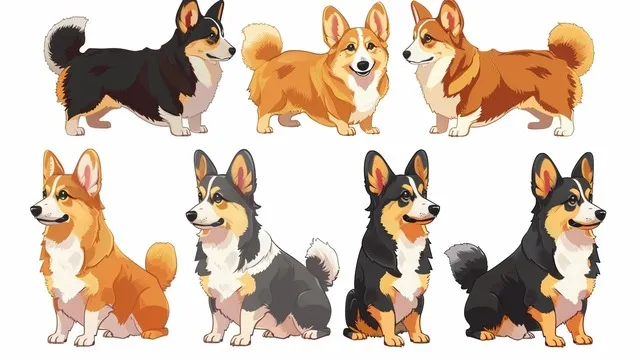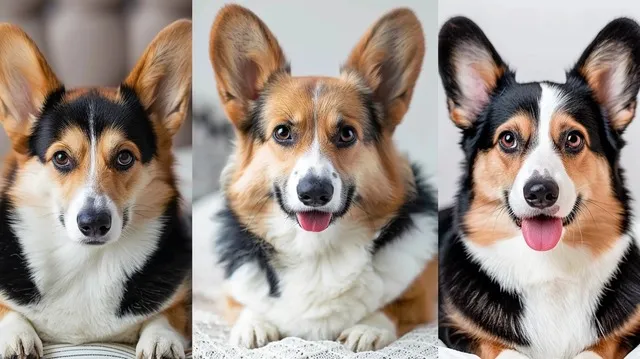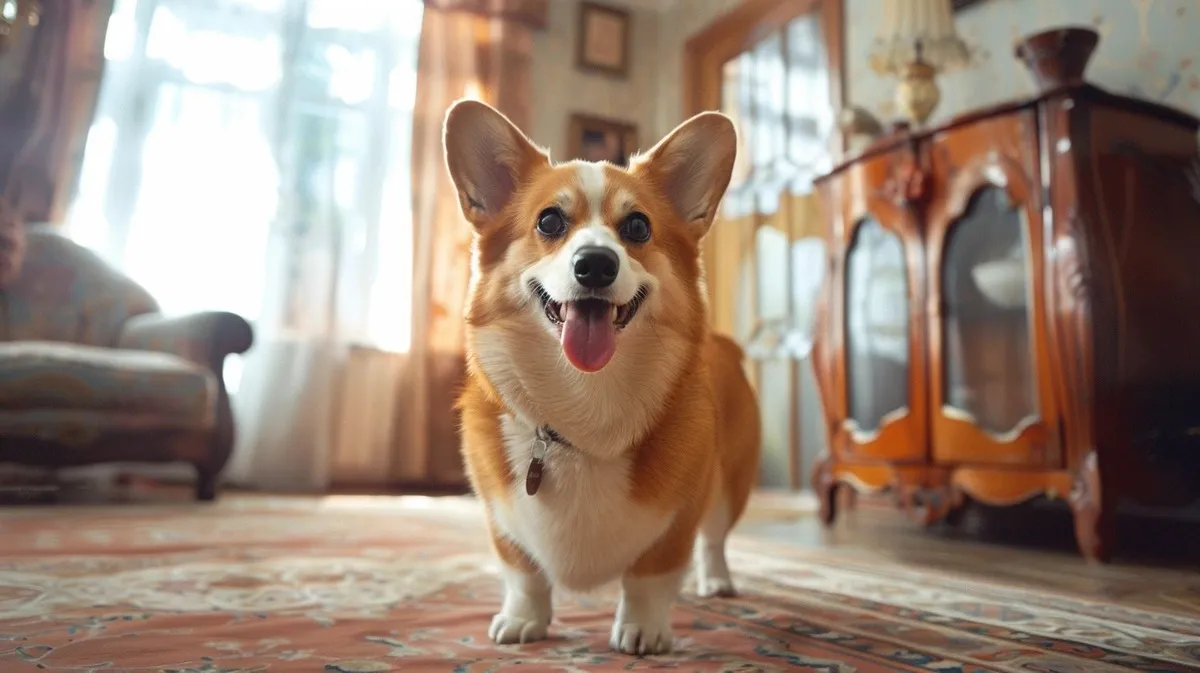Buckle up, dog lovers! Have you ever been charmed by a pint-sized pup with a big personality? Then the American Corgi might just steal your heart! These short-legged herders with foxy good looks are taking the dog world by storm.The American Corgi is a designer dog breed resulting from the intentional crossing of Pembroke Welsh Corgis and Cardigan Welsh Corgis. While not yet recognized as a distinct breed by major kennel clubs, these spunky canines are capturing the hearts of families and individuals alike.
The exact origins of the American Corgi remain somewhat hazy. However, we do know their parent breeds, the Pembroke Welsh Corgi and Cardigan Welsh Corgi, boast rich histories dating back centuries as working farm dogs in Wales. Some speculate that American Corgi development began in the mid-20th century, with breeders aiming to combine the distinctive coat patterns of the Cardigan Welsh Corgi with the shorter stature of the Pembroke Welsh Corgi.
Whether you’re a seasoned dog owner or a curious canine enthusiast, this comprehensive guide will equip you with everything you need to know about the American Corgi. We’ll delve into their temperament, care requirements, suitability for different lifestyles, and explore the unique charm that makes these little herders so beloved.

Unveiling the American Corgi
The Allure of the Short Stack
There’s no denying the American Corgi’s irresistible appeal. Their compact size, foxy faces, and wagging bottoms have won over celebrities, social media influencers, and everyday dog lovers alike. But what exactly makes these short-legged charmers so darn popular?
- Adaptable to Modern Living: Unlike their herding ancestors who spent their days working vast fields, American Corgis thrive in modern living situations. Their moderate exercise needs and playful personalities make them well-suited for apartments, houses, and even city living.
- Big Personalities in Small Packages: Don’t let their short stature fool you! American Corgis are overflowing with personality. They’re known for their intelligence, loyalty, and playful spirit. Be prepared for a furry friend who will keep you entertained with their antics and eagerness to please.
- Versatility Beyond Herding: While their herding instincts remain strong, American Corgis excel in various activities. They can be trained in agility, enjoy interactive puzzle toys, and even participate in therapy work due to their gentle nature (with proper training and temperament testing, of course).
Beyond the Mix Label
The debate surrounding the American Corgi’s breed status is an ongoing conversation. Here’s a closer look at the arguments on both sides:
- The “Mixed Breed” Argument: Opponents of the American Corgi as a distinct breed point to their relatively recent development and lack of recognition by major kennel clubs. They argue that American Corgis are simply a mix of Pembroke Welsh Corgis and Cardigan Welsh Corgis.
- The “Emerging Breed” Argument: Proponents of the American Corgi as a distinct breed highlight the stabilization of certain physical and temperament traits over generations of breeding. They believe the American Corgi deserves recognition as a unique breed due to its consistent characteristics.
Anatomy of an American Corgi
Unlike their Pembroke and Cardigan Welsh Corgi cousins, the American Corgi boasts some unique anatomical features:
- Short Legs, Big Body: The American Corgi’s most striking feature is undoubtedly its short legs compared to its body length. This is due to a genetic mutation that shortens the long bones in the legs.
- Foxy Face: Their wedge-shaped head and pointed ears contribute to their foxy resemblance.
- Varied Coat: American Corgis can have smooth or Pembroke-like double coats in various colors, including red, black and white, and fawn.

American Corgi vs. Lookalike Breeds
While the American Corgi has captured your heart, you might be curious about their resemblance to other short-legged breeds. Here’s a breakdown of the key differences between the American Corgi, Pembroke Welsh Corgi, and Cardigan Welsh Corgi to help you find your perfect match:
| Feature | Pembroke Welsh Corgi | Cardigan Welsh Corgi | American Corgi |
| Recognition | Recognized by major kennel clubs | Recognized by major kennel clubs |
Not yet recognized by major kennel clubs
|
| Size | Slightly smaller than American Corgi | Slightly larger than American Corgi | Varies |
| Coat | Double coat, predominantly red, black and tan, or fawn | Double coat, wider range of colors including brindle and merle |
Smooth or double coat, various colors
|
| Tail | Naturally bobbed tail or docked tail | Naturally long tail or docked tail |
Varies (naturally bobbed or docked)
|
| Temperament | Energetic, playful, vocal | Friendly, independent, adaptable |
Energetic, intelligent, loyal
|
| Health Concerns | Similar to American Corgi | Similar to American Corgi |
Similar to parent breeds
|
Table: Pembroke Welsh Corgi vs. Cardigan Welsh Corgi vs. American Corgi
Choosing Your Perfect Corgi Companion
Now that you have a clearer picture of the similarities and differences between these three breeds, let’s explore how to choose the right one for you:
- Lifestyle: Consider your activity level. American Corgis are generally the most energetic of the three. If you seek a more laid-back companion, a Cardigan Welsh Corgi might be a better fit.
- Living Space: All three breeds are adaptable to apartment living, but their exercise needs should be factored in.
- Grooming: American Corgis with smooth coats require less grooming than their double-coated counterparts.
- Temperament: Think about the personality you desire. Pembroke Welsh Corgis are known for their vocal nature, while Cardigan Welsh Corgis can be more independent.

Life with an American Corgi
Living with a Big Personality in a Short Package
Now that you’ve decided to welcome an American Corgi into your life, get ready for a whirlwind of love, laughter, and some occasional stubborn streaks! Here’s a comprehensive guide to caring for your new furry friend:
Temperament and Personality
American Corgis are bursting with personality despite their compact size. These eager-to-please pups excel in training thanks to their intelligence, readily learning tricks and commands. Generally friendly with children when raised together with proper supervision, their herding instincts can manifest as playful nipping. Early socialization with other pets is crucial to manage these tendencies. Their natural alertness translates to barking at unfamiliar sights or sounds, but consistent training can help curb this behavior.
Living with an American Corgi
American Corgis may be short in stature, but they’re brimming with energy! Daily walks are a must for their physical well-being, but remember, moderation is key to avoid strain on their short legs. To keep their minds sharp and bodies active, incorporate playtime with engaging activities like fetch, tug-of-war, or puzzle toys. You can even tap into their herding instincts through safe, controlled games that utilize herding balls or flirt poles.
Training
To cultivate a happy and well-behaved American Corgi companion, positive reinforcement training is the golden rule. Start training sessions early, as soon as your furry friend joins your home. Remember, short bursts of engaging training are more effective than long, tedious sessions. Always prioritize positive reinforcement with treats, praise, or petting for good behavior. Avoid punishment altogether, as it can damage the trust you’re building and hinder your training progress in the long run.
Grooming
The grooming needs of your American Corgi will depend on their coat type. For smooth-coated Corgis, a weekly brush will suffice to remove loose hair and dirt. However, double-coated Corgis require more frequent brushing, especially during the spring and fall shedding seasons. For these furry friends, consider incorporating professional grooming services occasionally to maintain a healthy and manageable coat.
Nutrition
A balanced and age-appropriate diet is essential for your American Corgi’s health and happiness. Opt for high-quality dog food specifically formulated for small, active breeds. Remember, portion control is key! American Corgis, with their short legs, are susceptible to obesity. Always discuss your Corgi’s specific dietary needs with your veterinarian, especially if they have any health concerns, to ensure they receive the optimal nutritional support.
Health Care
Common Health Concerns: Like all breeds, American Corgis are predisposed to certain health conditions. Here are some to be aware of:
- Intervertebral Disc Disease (IVDD): This condition affects the spine and can cause pain, paralysis, or neurological problems. Maintaining a healthy weight and avoiding activities that put strain on the back can help prevent Intervertebral Disc Disease (IVDD).
- Eye Issues: Cataracts and progressive retinal atrophy are potential eye concerns. Regular veterinary checkups can help detect these issues early.
- Preventative Care: Regular veterinary checkups, vaccinations, parasite control, and dental hygiene are essential for maintaining your Corgi’s overall health.
- Lifespan: The average lifespan of an American Corgi is 12-15 years with proper care.

Bringing Home Your American Corgi
Before welcoming your own American Corgi into the fold, care must be taken to ensure a smooth transition for both you and your furry friend. Responsible breeders prioritize the health and temperament of their dogs, so do your research to find one who aligns with your values. Alternatively, consider adopting from a rescue organization – many wonderful Corgis find themselves in need of loving homes. Once you’ve secured your pup, puppy-proofing your home is essential. This means removing electrical cords, securing valuables, and blocking off any potential hazards.
Stock up on essential supplies like a comfy bed, leash and collar, food and water bowls, engaging toys, and cleaning products for inevitable accidents. The first few days with your new Corgi can be overwhelming, so establish a quiet space for them to adjust, implement a feeding and potty schedule, and prioritize socialization with people and other pets. Remember, bringing home a dog is a lifelong commitment. American Corgis can live up to 15 years, so be prepared to provide unwavering love, care, and training throughout their journey with you.

Conclusion: The Alluring Allure of the American Corgi
The American Corgi has undeniably captured hearts with their irresistible charm, intelligence, and adaptability. Whether you envision an energetic hiking companion or a cuddly couch potato (with bursts of playful energy, of course!), the American Corgi can adapt to various lifestyles.
Owning an American Corgi is a rewarding experience. These short-legged charmers will keep you entertained with their playful antics and unwavering loyalty. However, remember, responsible dog ownership requires commitment. Be prepared to invest time in training, exercise, and proper care to ensure your Corgi thrives throughout their lifespan.
If you’re seeking a loyal, intelligent, and undeniably adorable canine companion, the American Corgi might just be your perfect match. Do your research, find a responsible breeder or rescue organization, and prepare to welcome a furry whirlwind of love and laughter into your life!

FAQ
What are the pros and cons of owning an American Corgi compared to a purebred Pembroke or Cardigan?
American Corgis offer a unique blend of traits from both parent breeds. They may be less prone to certain breed-specific health issues due to hybrid vigor. However, their appearance and temperament can be less predictable than purebreds.
Do American Corgis tend to have the herding instincts of their Corgi parents? How can this be managed?
Yes, American Corgis often inherit herding instincts. This can manifest as nipping at heels or trying to “herd” children or other pets. Early training and socialization are crucial to manage these instincts and channel their energy into appropriate activities.
Are there specific breeders specializing in American Corgis, or are they mainly found through rescue organizations?
While some breeders may intentionally breed American Corgis, they are more commonly found through rescue organizations or as accidental litters. It’s important to research thoroughly and ensure you’re getting a dog from a reputable source.
Since they’re not a recognized breed, how do American Corgis fare in terms of temperament predictability compared to purebreds?
While each dog is an individual, American Corgis can have a wider range of temperaments compared to purebreds due to the mix of genes. However, responsible breeders and careful selection can help ensure a well-tempered puppy.
Do American Corgis have a longer lifespan than purebred Corgis due to hybrid vigor?
While hybrid vigor can sometimes lead to increased longevity, it’s not guaranteed. American Corgis typically have a similar lifespan to purebred Corgis, ranging from 12 to 15 years with proper care and a healthy lifestyle..

I could talk about dog breeds all day! My goal is to help you find the four-legged friend who fits your life like a perfectly worn-in tennis ball fits in a dog’s mouth.

